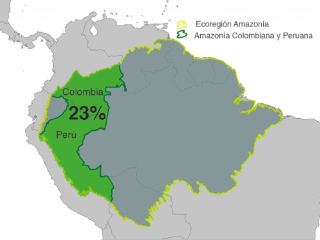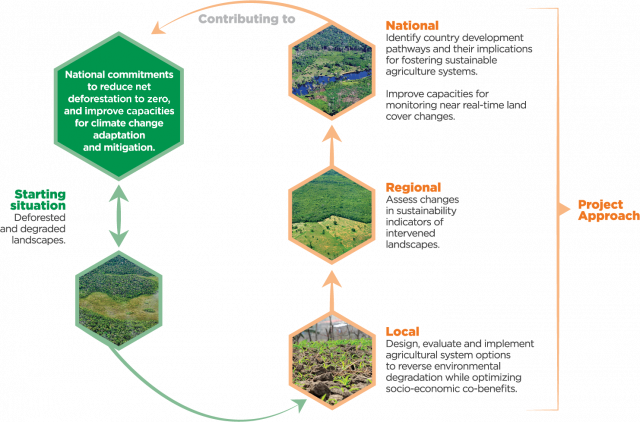Sustainable Amazonian Landscapes
| Together, Peru and Colombia house 23% of the Amazon rainforest. These are two countries that are aware of their importance as providers of ecosystem services at the local, national, regional, and global levels. In order to conserve and sustainably utilize the benefits provided by this ecosystem, we must design viable land use and management alternatives which can reduce pressure on the Amazon rainforest and serve as an adaptation and mitigation strategy in the face of climate change. |  |
 |
The objective of the project is to provide both national environmental authorities and local agricultural producers of Colombia and Peru with scientifically based evidence which elevates their capacity to both adapt to climate change and mitigate its effects, while at the same time improving environmental services and socioeconomic benefits for the agricultural producers. |
The departments of Loreto in Peru and Caquetá in Colombia have been selected as the sites where the project “Sustainable Amazonian Landscapes” is currently building upon initiatives that Peru and Colombia have undertaken to reduce deforestation, improve carbon sequestration, and strengthen local and national capacity for climate change adaptation.
Making use of a landscape-based approach, the project aims to work together in a participatory manner with local rural communities, regional and national environmental authorities, and national and international research institutions, to design and validate agriculturally productive land use and management alternatives. Likewise, the project will also assess the potential role that these different alternatives could play within the various possible frameworks for development in the region, as well as their implications for national priorities in the face of climate change.
The International Center for Tropical Agriculture (CIAT) is leading the implementation of this project, in which partners Potsdam Institute for Climate Impact Research (PIK), Amazon Institute of Scientific Research (SINCHI), Centre for Research on Sustainable Agricultural Production (CIPAV), Peruvian Amazon Research Institute (IIAP), University of the Amazon (Colombia), and National Agrarian University – La Molina (Peru) are committed to developing six outputs that will improve climate change adaptation and mitigation capacities within Amazonian communities and ecosystems:
- Establishment of an environmental and socioeconomic baseline of the currently deforested landscapes in Loreto and Caquetá.
- Development of sustainability indicators to assess the current status of the study sites and determine the impact of land use or management alternatives.
- Projection of potential impacts of climate change on crops, some key plant species, and hydrological ecosystem services.
- Participatory design and cost-effectiveness analysis of the sustainable land-use alternatives best suited to the climate change adaptation needs of the study sites.
- Identification and analysis of transition pathways towards sustainable development, as well as the effects of these pathways on the implementation of sustainable land use alternatives within climate change adaptation and mitigation schemes.
- Local validation of tools designed to monitor land cover changes, as well as capacity building in Peru on interpreting the detection of these changes. Validation and discussion, together with relevant national and subnational entities, of the project’s approaches, outcomes, and recommendations.
These outputs will allow us to obtain science-based information to aid with determining whether:
- Land use and management alternatives can contribute to climate change adaptation and mitigation.
- A landscape-based approach can reconcile agricultural activities with forest conservation.
- Sustainability can be assessed through indicators based on scientific evidence and local perceptions; and whether this, in turn, will facilitate dialogue with policy makers.




















